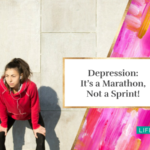 ________________________________
________________________________
This content has been provided by Flagler Health+
If you have questions about the flu, check out Flagler Health for more information.
Between Thanksgiving and the New Year, busy schedules, more downtime at home, spending additional time on their phones, and sky-high expectations from family and friends can lead to feelings of loneliness and depression for teens. These changes can lead to Seasonal Affective Disorder (SAD), self-harm, and suicide.
For some young adults, the winter months are a cozy time of year, filled with family gatherings and a general sense of joy and gratitude. For others, however, the cold season can feel just that — cold. Each year, teens report feeling the “winter blues.”
Teens aware of their depression and who have dealt with it for years sometimes try to “tough it out” during the winter months while waiting for the spring. But if you have recently been diagnosed, you probably have many questions. Knowing how to prepare for seasonal depression is an essential part of the healing process, so it’s important to speak with a behavioral health professional to find ways to prepare and cope.
While SAD can leave you feeling hopeless, there are solutions and ways to cope with it this year. You don’t have to endure alone. A behavioral health professional can help you navigate and answer your most pressing questions.
What are some symptoms of seasonal depression?
Understanding the symptoms of SAD can help you realize if you are being affected. Some symptoms can include mood changes and symptoms similar to depression, such as sadness, loss of interest in hobbies and activities that used to bring you joy, low energy, agitation, and difficulty concentrating. Some other symptoms to look for can be oversleeping, overeating, weight gain, or social withdrawal. Recognizing these symptoms or if you have noticed any changes in your behavior as the winter months roll in can help you know if you need to talk to a doctor or guardian about SAD.
Can You Heal from Depression Without Medication?
One of the most common questions providers receive is whether patients need medication for SAD. There are several ways to cope, but how do you know if you need medication for depression? Its causes and symptoms vary from person to person, so the answer is more complicated than you think.
To start, a medical provider must diagnose your depression through diagnostic evaluations, including a physical exam, lab tests, or a psychological evaluation. During a physical examination, your provider will likely ask in-depth questions about your health to see if it is linked to an underlying physical problem. Alternatively, they may conduct a blood test to see if your thyroid is functioning correctly. As you may expect, many providers may opt for a psychological evaluation to gauge your symptoms, thoughts, and behavioral patterns.
Once a healthcare provider diagnoses you, they will likely develop a treatment plan based on the determined cause. For instance, if the cause of your depression is determined to be entirely psychological, your provider may recommend talking with a therapist to help you move forward. However, if you suffer from severe SAD, your provider may provide the medication with an extended release to help prevent depressive episodes. Importantly, it may take several weeks to notice the effects of antidepressants. If you believe you need to speak to a doctor, reach out to a parent or guardian to help you make an appointment.
Does Vitamin D Help Seasonal Depression?
Depending on the diagnosis, vitamin D could be an effective solution for you this year. SAD often peaks during winter when the daytime is shorter and the days are colder. During this time, people go outside less often, dramatically reducing their vitamin D intake. One potential solution is to increase your vitamin D intake with supplements and through a treatment method known as light therapy.
With light therapy, also known as phototherapy, you sit within a few feet of a light box when you first wake up every day. The lightbox produces something similar to natural light and can cause a positive change in brain chemicals linked to mood. Light therapy is one of the first treatments providers try. That’s because it only takes a few days to work and has few side effects. However, a doctor may not prescribe light therapy if you have bipolar disorder, as it could trigger manic episodes.
What are some other options?
Outside of light therapy, a healthcare provider may recommend changes to your diet and exercise routine to incorporate more vitamin D. Doctors could recommend vitamin D supplements or daily outdoor exercise to increase vitamin D exposure and endorphins. Outdoor activity has been proven to help teens improve their physical and mental health.
A provider may also recommend seeing friends and staying involved in your social circle. Finding a supportive group of people who can be there for you during the winter months can be a huge help. Laughter is a documented stress reliever. Staying involved in activities that make you happy is another great way to keep the winter blues at bay.
If you struggle with SAD, then you understand how debilitating it can be. That’s why seeking help is essential if something seems out of the ordinary. If you have questions, speak with one of the professionals at Flagler Health+ today to learn more.





Be the first to comment